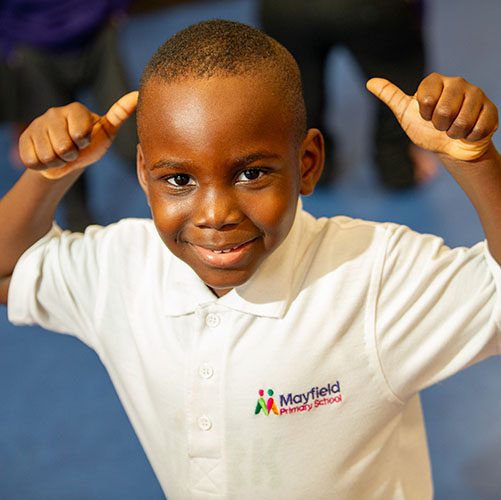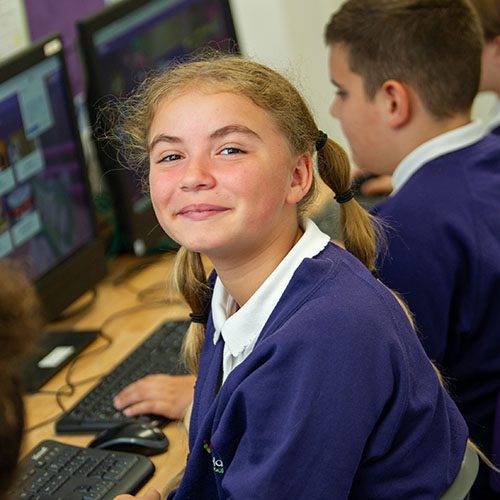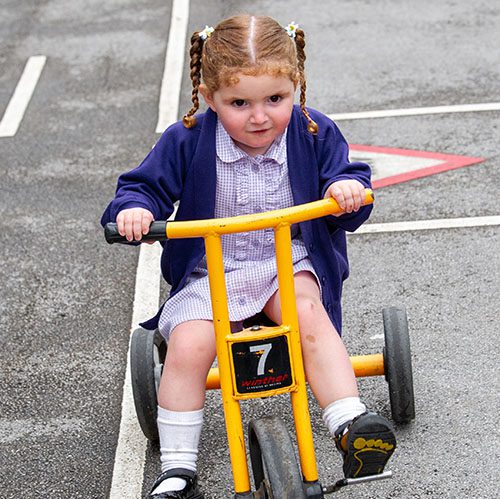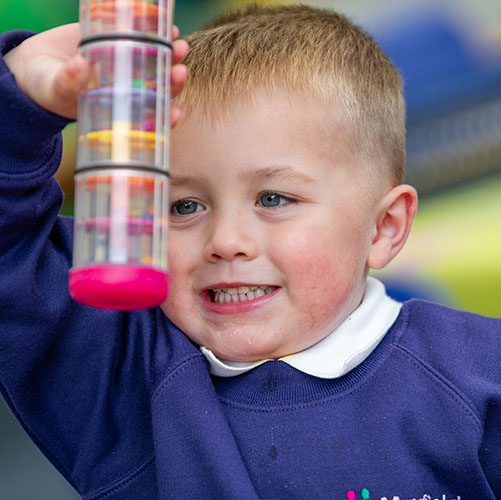English
Vision for English (Intent)
English has a prominent place in education and in society. A high-quality education in English at Mayfield Primary School will teach pupils to speak and write fluently so that they can communicate their ideas and emotions to others and through their reading and listening, others can communicate with them. Through reading, pupils have a chance to develop culturally, emotionally, intellectually, socially and spiritually. Reading, especially, plays a key role in such development. Reading also enables pupils both to acquire knowledge and to build on what they already know. All the skills of language are essential to participating fully as a member of society; pupils, therefore, who do not learn to speak, read and write fluently and confidently are effectively disenfranchised.
English Subject Leaders-
Miss Davys (Writing & SPaG), Mrs Davies (Reading) & Miss Alderson (Phonics and Early Reading)
Long Term Plan
|
|
Long Term Plan
|
National Curriculum Aims
The National Curriculum for Reading aims to ensure that all pupils:
The overarching aim for English in the national curriculum is to promote high standards of language and literacy by equipping pupils with a strong command of the spoken and written word, and to develop their love of literature through widespread reading for enjoyment. The national curriculum for English aims to ensure that all pupils:
- read easily, fluently and with good understanding
- develop the habit of reading widely and often, for both pleasure and information
- acquire a wide vocabulary, an understanding of grammar and knowledge of linguistic
- conventions for reading, writing and spoken language
- appreciate our rich and varied literary heritage
- write clearly, accurately and coherently, adapting their language and style in and for a
- range of contexts, purposes and audiences
- use discussion in order to learn; they should be able to elaborate and explain clearly
- their understanding and ideas
- are competent in the arts of speaking and listening, making formal presentations,
- demonstrating to others and participating in debate.

How is Reading taught and what does it look like at Mayfield? (Implementation)
The teaching of reading is an essential part of our school curriculum. At Mayfield, our curriculum is designed with the intent that each child becomes a caring, confident, and curious young person with a passion for learning and achieving. It is our belief that reading is the key to unlocking this passion and curiosity for the world and that reading can open the door to a successful and happy future for our children. Our curriculum is carefully designed to ensure that all children leave the school with the ability to read, no matter where their starting point in their journey to reading may have been.
Early Years (Nursery and Reception)
The skills of early reading are taught to the children from the first moment they enter school. An enjoyment of reading is fostered through hearing stories, singing rhymes, making books and taking books home.
EYFS/KS1
Little Wandle (Letters and Sounds Revised) drives the teaching of reading across EYFS and KS1 through the application of phonics to reading using matched decodable books. Children at Mayfield develop their fluency skills by reading fully decodable books that match their secure phonics knowledge. The Little Wandle scheme includes Reading Practice Sessions (guided read) , which ensure children become fluent readers, who understand what they are reading. Reading Practice Sessions are timetabled daily and have a clear focus: decoding, prosody and comprehension. The books that are used during these sessions are very important; books are fully decodable and exactly matched to the Collins Big Cat books. Assessments are used to match the children’s secure phonics knowledge in reading words to the right books, so children are successful when they learn to read.
KS2
In KS2, reading lessons are taught daily. They are based around using high quality texts, which promote challenge, fluency and stamina. texts from Literacy Shed+ are used, and links to the wider curriculum are promoted where possible. In KS2 we work towards children becoming independent, fluent readers. KS2 children who are still on the reading scheme continue to receive individual reading sessions and intervention.
Guided Reading
EYFS/KS1
The Little Wandle scheme includes Reading Practice Sessions (guided read) , which ensure children become fluent readers, who understand what they are reading. Reading Practice Sessions are timetabled daily and have a clear focus: decoding, prosody and comprehension. The books that are used during these sessions are very important; books are fully decodable and exactly matched to the Collins Big Cat books. Children are exposed to the KS1 reading content domains from as early as nursery. At Mayfield, the reading content domains are represented as our Mayfield Reading Crayons from EYFS-Y6. For example, children are introduced to Vocabulary Violet (1a) and Retrieval Ruby (1b) in EYFS and this continues to be embedded as they progress throughout KS1. By the time children reach Year 2, they are fully exposed to the KS1 Reading Crayons (content domains) and guided read sessions progress away from the Little Wandle scheme, and the focus shifts to comprehension, once children’s reading fluency and stamina is embedded.
KS2
In KS2 we use a whole class reading method to deliver the reading lessons to the children. Whole class guided reading sessions mean that children of all attainment bands are immersed in the same high-quality literature and the discussions that these texts promote, whilst still getting the support they need. Texts are carefully chosen and (where possible) closely link to the topic of the half term. All genres are covered, including song lyrics, poetry, instructions – not just fiction books!
Daily guided read sessions are timetabled across KS2, lasting 30 minutes per day. Each week, guided read sessions focus on a specific Reading Crayon (content domain) and the skills for answering question of that domain are taught, using a topic based, high quality class text. However, over the course of the week, all content domain strands are covered. Children’s independence of answering questions are then assessed once week through our ‘Ready, Steady…Read!’ assessments, which include an unseen text and specific content domain questions. Interventions are then implemented if children are found to be struggling with any aspect of their reading fluency, stamina or comprehension.
Home/School Reading
At Mayfield, we recognise the vital role that parents play in the development of early reading skills. High quality advice and support can be provided by all staff at Mayfield, so that parents/carers are able to ensure they are supporting their children in the best way possible, to develop their child’s reading. Every child, from EYFS-Y6, has a reading book, which is read in school and can then be taken home to share with parents/carers. A home–school reading record is used to encourage links with our families at Mayfield. Our school encourages that parents/carers read with their child every day and that they record this in their child’s reading record.
Library book scheme
All children from EYFS-KS1 take home a Little Wandle reading book, which is fully decodable and linked to their phonics teaching sessions in school. The genres are varied, to encourage our children at Mayfield to read a range of books. Each class has a reading area, which has many high-quality reading books available for children to choose from to read in school and at home.
Reading Challenge
The Mayfield Reading Challenge is a challenge whereby we encourage our parents/carers and children to read together every night at home. When the children reach certain milestones (recorded in their Reading Challenge reading record), they are rewarded with medals, certificates, trophies and special trips at the end of the year. Getting children interested in books from a young age is essential for them to develop a keen interest in reading. Sharing books with families and friends, especially at bedtime, is a key way we can promote this.
What will my child leave Mayfield knowing, understanding and appreciating in Reading? (Impact)
At Mayfield Primary School, we want all children to leave Year 6 able to read accurately, fluently and expressively. We aim to encourage them to foster a love for reading that will last a lifetime. With the implementation of our English curriculum, we are able to confidently ensure that our children, before leaving us at the end of KS2, have experienced a wide range of books: fiction, non-fiction and poetry, classics, recent titles, books by a wide range of authors and books which reflect the lives of a broad range of cultures. They will have the opportunity to enjoy books in different calm places: our wonderful reading corners (in classrooms from EYFS-Y6). Teachers share engaging class stories every day and provide pupils with lots of opportunities to discuss their thoughts and opinions about what we have read. Through the use of our Mayfield Reading Crayons, children will have a confident understanding of the Reading Content Domains and acquire the necessary skills to answer a variety of reading assessment questions.

How is Writing taught and what does it look like at Mayfield? (Implementation)
Mayfield’s 5 Phase Approach to Writing
- Phase 1 – Creating Interest
- Phase 2 – Reading, Responding and Analysing
- Phase 3 – Planning and Gathering Content
- Phase 4 – Writing
- Phase 5 – Editing and Improving (Polished Piece)

What will my child leave Mayfield knowing, understanding and appreciating in Writing? (Impact)
As writers, we want children at Mayfield to be able to express themselves articulately and always considering different purposes and audiences. Our teachers will help them to develop a full range of writer’s techniques. Mayfield’s English plans have a clear focus on ensuring children leave primary school with a secure understanding of spelling, punctuation and grammar to enable them to communicate clearly and have the best possible chance of becoming age related writers. We want our children to believe anything is possible and know that the sky is the limit when it comes to their creativity within writing!
|
|
Our Approach to the Teaching of Phonics and Reading
|
|
|
Phonics
|
|
|
Spoken Language
|
English Pupil Voice – What do our children think of English at Mayfield? (Impact)
“I enjoy how my teacher reads out our texts to us and gives us ideas for our writing.”
“I love the Reading Crayons because they are colourful and they help me understand and discover things in the text!”
“I like how we have such a big selection of books in our class!”
“I enjoy making my handwriting better!”
“I like it when I am able to write independently and come up with my own ideas.””






Mayfield Primary School is proud to be part of the Cranmer Education Trust
Cranmer Education Trust is a company limited by guarantee and an exempt charity registered in England. Company registration number: 07687709. Registered Office: Cranmer Education Trust, c/o The Blue Coat School, Egerton Street, Oldham OL1 3SQ. The website address is www.cranmereducationtrust.com and the phone number 0161 785 5082.



